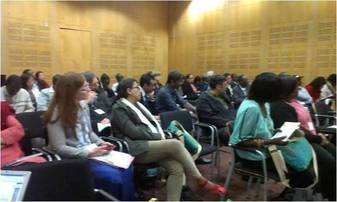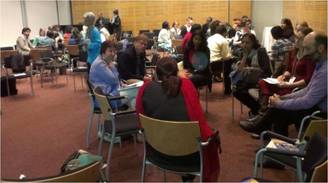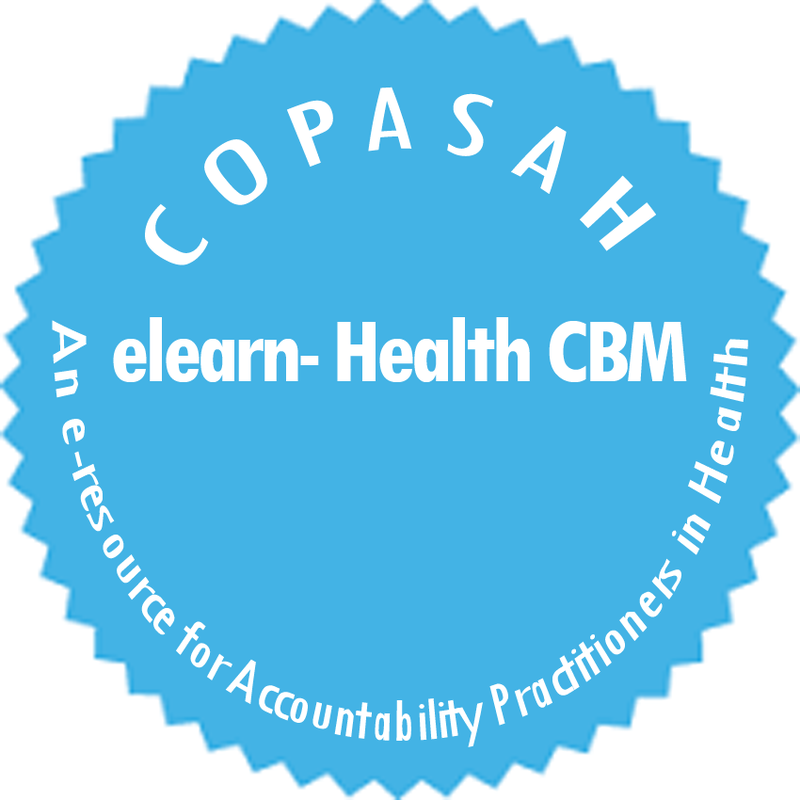
|
|
COPASAH at GSHSR 2014, Cape Town, South Africa
3rd Global Symposium on Health Systems Research (GSHSR)
|
E PREMDAS PINTO
|
|
COPASAH’s presence at the third Global Symposium on Health Systems Research (GSHSR) held in Cape Town (South Africa) from Sept 29 –Oct 4, 2014 was marked by oral as well as poster presentations done by COPASAH members, in the sessions (COPASAH organised) that were facilitated by COPASAH, and sessions co-organised by COPASAH with EQUINET and presentations in the satellite sessions. The COPASAH perspective of citizen centric social accountability practice in health and empowerment of the marginalised communities was communicated through the COPASAH products displayed in the market place.
|
COPASAH Session at GSHSR
|
Satellite Session
COPASAH members participated in a satellite session titled, ‘New Resources and Opportunities for Participatory Research in Health Systems: Areas of focus for Health Systems Global,’ held on September 30, 2014. Abhijit Das, director of CHSJ (India), along with D. Walter Flores (CEGGS, Guatemala) representing COPASAH made presentations on behalf of COPASAH, in association with Rene Loewenson, EQUINET, East and Southern Africa. This session premised upon presentations and discussions with participants on the issues, resources and capacities for participatory research, further deliberating on how these could be developed and supported through the SHaPeS Thematic Working Group in Health Systems Global. It reviewed the work done so far and launched the key resources on participatory action research, social accountability and innovations in social media in health systems research from networks such as EQUINET and COPASAH. The session was organised by COPASAH, EQUINET and Rotterdam Global Health Initiative Erasmus University, for the participatory cluster in the SHaPeS TWG for Health Systems Global.
COPASAH organised session
A session organised by COPASAH was held on October 1, 2014 titled: ‘Building People-Centred Health Systems through the Social Empowerment of Marginalized Populations: Moving from Theory to Practice.’ The session focused on the original experiences of learning communities and knowledge translation platforms engaged in strengthening health systems. The session was chaired by Edward Premdas Pinto from Centre for Health and Social Justice, India. The important objective of this session was to discuss and learn from experiences on moving from theory into practice in building people-centred health systems that are particularly responsive to marginalized populations. The participatory methodology was used in the facilitation that included case studies from Guatemala (Citizens’ vigilance of public policies and services), Uganda (Facilitating the Spaces for Community Participation through Dialogues ) and India (Marginalised Women’s Initiatives for Maternal Health) presented by Walter Flores, Geoff and Renu Khanna, respectively. The presentations were followed by group discussions facilitated by Barbara Kaim (TARSC/EQUINET, Zimbabwe) on participant’s experiences of empowerment of communities, practices of building people centred health systems and the challenges therein.
The session received an overwhelming response, with participation from over 80 delegates from different nationalities.
COPASAH table in market place
COPASAH had set up a table in the market place during the GSHSR symposium at Cape Town, wherein the knowledge products and publications of COPASAH including dissemination materials such as COPASAH Knowledge Key (a USB/pen drive with all the compiled knowledge products of COPASAH, COPASAH, Communiqué (Newsletter), pamphlet on COPASAH vision and mission, the exhibition of the issue papers and case-studies were showcased.
The COPASAH table was frequented by number of researchers who took away the research materials and had engaging discussions with COPASAH members.
COPASAH members participated in a satellite session titled, ‘New Resources and Opportunities for Participatory Research in Health Systems: Areas of focus for Health Systems Global,’ held on September 30, 2014. Abhijit Das, director of CHSJ (India), along with D. Walter Flores (CEGGS, Guatemala) representing COPASAH made presentations on behalf of COPASAH, in association with Rene Loewenson, EQUINET, East and Southern Africa. This session premised upon presentations and discussions with participants on the issues, resources and capacities for participatory research, further deliberating on how these could be developed and supported through the SHaPeS Thematic Working Group in Health Systems Global. It reviewed the work done so far and launched the key resources on participatory action research, social accountability and innovations in social media in health systems research from networks such as EQUINET and COPASAH. The session was organised by COPASAH, EQUINET and Rotterdam Global Health Initiative Erasmus University, for the participatory cluster in the SHaPeS TWG for Health Systems Global.
COPASAH organised session
A session organised by COPASAH was held on October 1, 2014 titled: ‘Building People-Centred Health Systems through the Social Empowerment of Marginalized Populations: Moving from Theory to Practice.’ The session focused on the original experiences of learning communities and knowledge translation platforms engaged in strengthening health systems. The session was chaired by Edward Premdas Pinto from Centre for Health and Social Justice, India. The important objective of this session was to discuss and learn from experiences on moving from theory into practice in building people-centred health systems that are particularly responsive to marginalized populations. The participatory methodology was used in the facilitation that included case studies from Guatemala (Citizens’ vigilance of public policies and services), Uganda (Facilitating the Spaces for Community Participation through Dialogues ) and India (Marginalised Women’s Initiatives for Maternal Health) presented by Walter Flores, Geoff and Renu Khanna, respectively. The presentations were followed by group discussions facilitated by Barbara Kaim (TARSC/EQUINET, Zimbabwe) on participant’s experiences of empowerment of communities, practices of building people centred health systems and the challenges therein.
The session received an overwhelming response, with participation from over 80 delegates from different nationalities.
COPASAH table in market place
COPASAH had set up a table in the market place during the GSHSR symposium at Cape Town, wherein the knowledge products and publications of COPASAH including dissemination materials such as COPASAH Knowledge Key (a USB/pen drive with all the compiled knowledge products of COPASAH, COPASAH, Communiqué (Newsletter), pamphlet on COPASAH vision and mission, the exhibition of the issue papers and case-studies were showcased.
The COPASAH table was frequented by number of researchers who took away the research materials and had engaging discussions with COPASAH members.
Presentations made by COPASAH members at GSHSR
Prominent members of COPASAH who are also researchers in health systems and health rights from various countries made oral presentations as well as poster presentations in the symposium.
Oral presentations included the following topics
Prominent members of COPASAH who are also researchers in health systems and health rights from various countries made oral presentations as well as poster presentations in the symposium.
Oral presentations included the following topics
- Dr Abhijit Das, India: ‘Community Based Monitoring Improves Informed Choice and Quality of Care of Family Planning Services.’
- Abhay Shukla, India:, ‘Communities Reclaim the Health System, Making Services People-Centred: Lessons from Community Monitoring and Planning of Health Services in Maharashtra, India.’
- Ariel Frisancho, Peru : ‘Inequities in Health Care for the Indigenous and Afro-Descendant Population in Latin America: Contributions of Civil Society Organizations to Assemble Participatory Governance in Health Care Systems.’
- Walter Flores, Guatemala: ‘Exploring the Governance of the Guatemalan Health System: Power Relations Affecting Decision-Making and its Implications for Equity.’
- Jashodhara Dasgupta, India: ‘Informed, Organized and Empowered: Poor Rural Women's Negotiations for Health and its Social Determinants in Uttar Pradesh, India.’
- Barbara Kaim, Zimbabwe was the facilitator of one day Post Global Symposium Workshop titled ‘Participatory Action Research in People Centred Health Systems’ held on October 4, 2014. This workshop was hosted by TARSC and pra4equity network in the Regional Network for Equity in Health in east and southern Africa (EQUINET) and Asociación Latinoamericana de Medicina Social (ALAMES). Monitoring Capacity Building of Community Based Organisations (CBOs) for Accelerating State Responsiveness to Human Rights Issues of Health Care Madhya Pradesh (MP), India’ was presented by E. Premdas Pinto (Director – Research and Advocacy) from CHSJ, co-authored with Dr Abhijit Das, India.
|
Informal interaction among COPASAH members at GSHSR
|
Steering committee (SC) meeting: The global steering committee members held meeting to discuss the strategic positioning of COPASAH in the future, while taking stock of the strengths and challenges before COPASAH.
- The strategic positioning of COPASAH in the current global context was discussed at length. ‘Focus on global advocacy for COPASAH’s vision of social accountability, Capacity building to be done at the regional activities as nodes of practice’ emerged as the overall thrust for the future.
- Organising COPASAH to work for with a global focus was an aspect that was discussed at length. The need to strengthen COPASAH AS COLLEGIUM OF PRACTITIONERS consisting of SC members, persons with similar perspectives and practice, alliances with health rights groups was discussed.
- Regional leadership was asked to focus on consolidating regional nodes of practice with emphasis on in-depth practice. Thematic nodes to strengthen trans-regional solidarity in practice were discussed. Some of the thematic nodes finalised included - Participatory Action.
- Research (Convener: Barbara Kaim, Zimbabwe), indigenous communities (Convener: Ariel, Peru), Accountability of private sector (Convener: Abhay Shukla, India).
Conclusion
Converging at Cape Town provided opportunity for COPASAH to be introduced to the global public health community consisting of practitioners, researchers and very many members of COPASAH. It also opened up new avenues for COPASAH to think about it’s reach, relevance and future possibilities
Converging at Cape Town provided opportunity for COPASAH to be introduced to the global public health community consisting of practitioners, researchers and very many members of COPASAH. It also opened up new avenues for COPASAH to think about it’s reach, relevance and future possibilities
|
|
ABOUT AUTHORS
The report is compiled by E. Premdas Pinto, who represented COPASAH at the GSHSR symposium. He is the Global Secretariat Coordinator for COPASAH. As an Advocacy and Research Director at Centre for Health and Social Justice (CHSJ), India, he facilitates the thematic area of social accountability with a special focus on processes of community monitoring and accountability in health. She also coordinates the South Asia region for COPASAH.
To know more about the work of CHSJ and COPASAH please visit : www.chsj.org; www.copasah.net and www.copasah.org
The report is compiled by E. Premdas Pinto, who represented COPASAH at the GSHSR symposium. He is the Global Secretariat Coordinator for COPASAH. As an Advocacy and Research Director at Centre for Health and Social Justice (CHSJ), India, he facilitates the thematic area of social accountability with a special focus on processes of community monitoring and accountability in health. She also coordinates the South Asia region for COPASAH.
To know more about the work of CHSJ and COPASAH please visit : www.chsj.org; www.copasah.net and www.copasah.org









